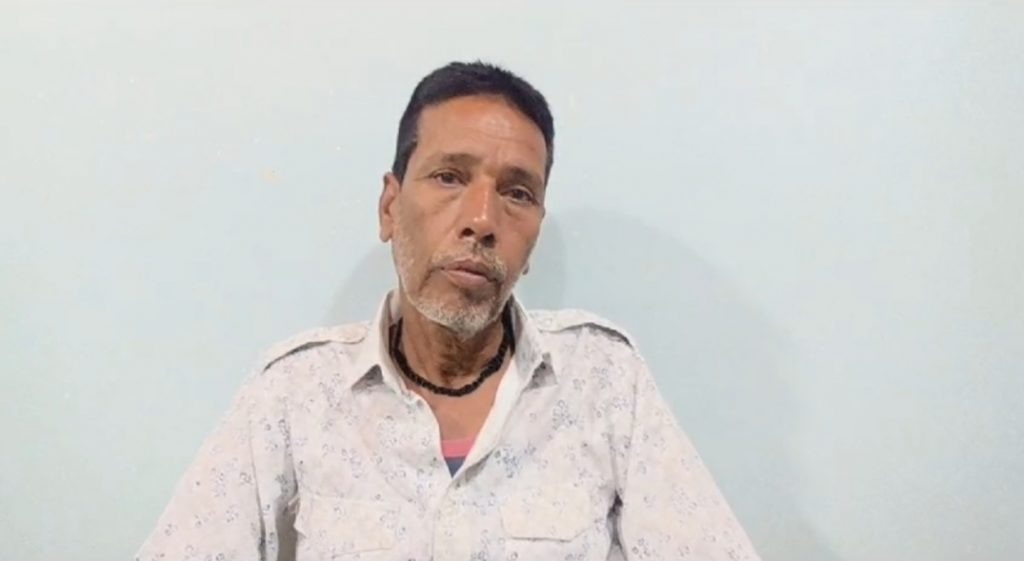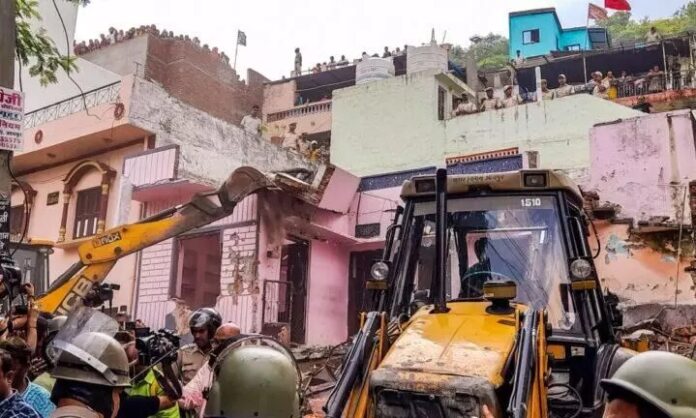By Anwarulhaq Baig
NEW DELHI: Two demolition victims – one from Madhya Pradesh and another from Rajasthan – are among several intervention petitioners in the ongoing demolition case brought by the Jamiat Ulama-i-Hind’s (JUH) in the Supreme Court.
The case is being heard by a two-judge bench comprising B.R. Gavai and K.V. Viswanathan.
The bench has given a stay on all demolitions all over the country till October 1, 2024, and ordered that no demolition will be done without its prior approval.
However, the order does not extend to unauthorized structures in public places or cases where a court has already ordered demolition.
The victim from MP is Mohammad Hussain of Jaora town in Ratlam district and the one from Rajasthan is Rashid Khan of Udaipur. While senior advocate C U Singh represents Mohammed Hussain, advocate Fauzia Shakeel represents Rashid Khan in the apex court.
Based on these petitions, the Supreme Court issued notices to the state governments of Rajasthan and Madhya Pradesh which are returnable on October 1, 2024, the next date of hearing in the case.
Both the victims submitted that their homes were bulldozed illegally by state authorities. They claimed that the actions of the local authorities were “arbitrary and punitive”.
Mohammad Hussain: A labourer’s story of a partially demolished home
The house of Mohammad Hussain, a labourer from Jaora in Madhya Pradesh’s Ratlam district, was demolished partially based on allegations against his son. Besides seeking directives to prevent authorities from taking “precipitative action” in the demolition of residential or commercial properties belonging to individuals accused in criminal cases, Hussain also requested the Supreme Court to order a judicial inquiry into the arbitrary actions, direct the authorities to rebuild his house, compensate him for his losses, and punish the officers involved in the illegal demolition.
Hussain submitted that he is a co-owner of the property with his mother. The dwelling, measuring 36 feet by 8 feet, comprised a ground floor with one room, a kitchen, a toilet, a bathroom, and an upper floor with a large hall. Adjacent to it was a small shop measuring 8 feet by 6 feet.
According to the application, the property’s history dates back to January 5, 1990, when Hussain’s grandfather, Noor Mohammad, divided a 1,600 sq. ft. property equally among his five sons through a gift deed. Hussain’s father, Bulbul, inherited the portion where the house and shop stood.
The demolition was carried out by authorities following communal tensions that erupted on June 13-14, 2024, after an amputated bovine head was found on the premises of a local temple in Jaora. The incident led to protests by right-wing groups, who demanded the arrest of the accused and the demolition of their houses.
On June 14, police arrested two Muslim men and registered an FIR against four accused, including Hussain’s son, Salman Mevati. The following day, authorities invoked the National Security Act (NSA) against the accused.
Despite Hussain’s attempts to inform authorities about his lawful co-ownership of the property and a temporary injunction granted by a local court in his favour, the district administration partially demolished about 10 feet of the structure on June 14.
Hussain asserts that he presented relevant documents to the authorities, but they ignored him and proceeded with the demolition, rendering the home uninhabitable and forcing him and his family to seek shelter with relatives. He claims that he was not issued any formal notice regarding the alleged illegality of the property, accusing the authorities of acting with impunity and in violation of established legal procedures. He argues that the principles of fair and transparent governance require that any action affecting citizens’ properties must adhere to proper legal standards.
Hussain has requested the Supreme Court to order a judicial inquiry into the arbitrary actions, direct the authorities to rebuild the structure, compensate him for his losses, and punish the officers involved in the illegal demolition.
Rashid Khan: An auto Driver’s home razed
Rashid Khan had rented out of property. It was demolished as a retaliatory action because of the involvement of his tenant’s son in a criminal case. Rashid Khan is an auto-driver by profession.,
Khan purchased the single-story dwelling in Diwan Shah Colony, Patel Circle, Udaipur, on February 26, 2019, for Rs 16.5 lakh, using savings from years of work and loans from relatives and acquaintances.

Rashid Khan, Udaipur.
The property, consisting of four rooms, a kitchen, a bathroom, and a small shop in the basement, was rented to two tenants. One of these tenants, Saleem Shaikh, lived there with his family, including a specially-abled daughter who operated the small shop rent-free.
The demolition was carried out by authorities following an incident on August 16, 2024, when the 16-year-old son of Saleem Shaikh allegedly stabbed a classmate during a dispute at school in Udaipur. The injured minor passed away on August 19, sparking large-scale violence with communal undertones, leading to arson, vandalism, and provocative demonstrations.
Following this, the right-wing organizations and a local BJP MLA called for “bulldozer action.” On the morning of August 17, police visited Khan’s property and directed the tenants to vacate. Two notices were pasted on the property: one from the Udaipur Municipal Corporation and another from the Regional Forest Officer, Udaipur West, providing a 24-hour show-cause notice and time until August 20 to remove alleged encroachments.
Despite Khan’s attempts to submit responses affirming his ownership and the tenant status of Saleem Shaikh, the authorities proceeded with the demolition on August 17. Khan contends that the demolition was executed arbitrarily, illegally, and with malice, as a punitive measure.
In his application, Khan asserts that the provisions of the Rajasthan Municipalities Act, 2009, do not apply to his case since the construction is over 40 years old. He also points out that the authorities acted contrary to their own notices and statutory provisions, conducting the demolition before the stipulated time had elapsed.
Khan seeks protection from further demolitions, requesting that the Union government and all states refrain from punitive actions against the properties of any accused in criminal proceedings.
Despite the Udaipur Divisional Commissioner indicating that the stabbing was a personal dispute without communal implications, authorities moved swiftly against Khan’s property. He asserts that the demolition violated several provisions of the Rajasthan Municipalities Act, 2009, and the Rajasthan Land Revenue Act, 1956, which require reasonable notice and a proper adjudication process before demolition can occur.





